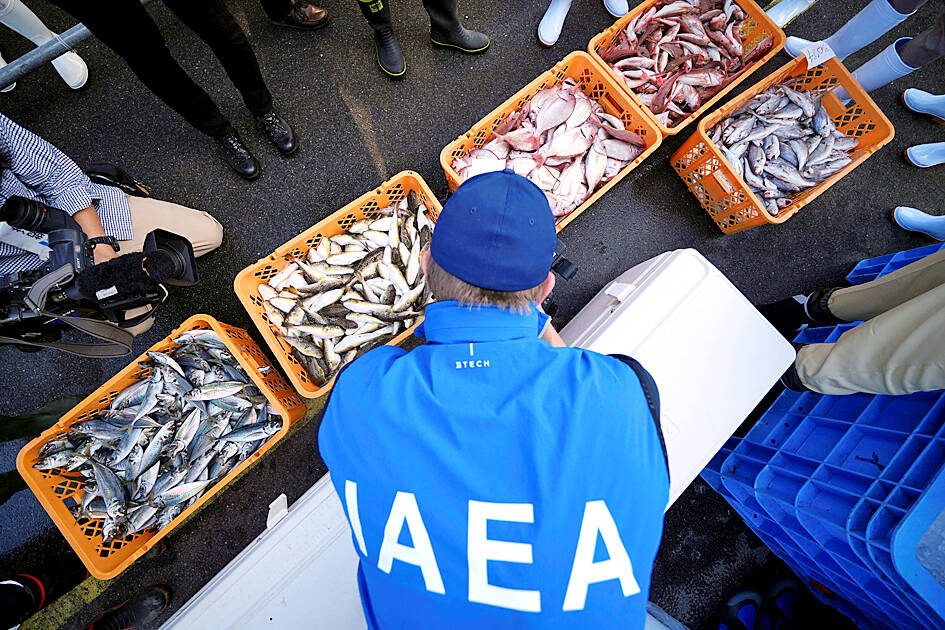The Food and Drug Administration (FDA) on Wednesday announced that almost all produce from five Japanese prefectures affected by the 2011 Fukushima Dai-ichi nuclear power plant disaster would now be allowed into Taiwan.
The five are Fukushima, Gunma, Chiba, Ibaraki and Tochigi.
The only items that would still be blocked from being imported into the nation are those that are still banned from being circulated in Japan, the FDA added.

Photo: Reuters
With the removal of the ban, items including mushrooms, the meat of wild birds and other wild animals, and koshiabura” (foraged vegetables) would now be permitted to enter Taiwan, along with the other produce permitted since 2022.
All food items imported from the five prefectures must be accompanied by radiation and origin certificates and undergo batch-by-batch inspections, FDA Deputy Director-General Lin Chin-fu (林金富) said.
The amendment to the regulations permitting the imports was made known to the public 60 days ago to allow for feedback.
The FDA did not receive any comments of note during the period, Lin said.
Seafood, mushrooms, tea, dairy products and baby food imports from areas outside the five prefectures would only be required to present origin certificates. Radiation certification would no longer be necessary.
Taiwan banned all food imports from the five prefectures for almost 11 years following the disaster in Fukushima.
Japanese Minister of Agriculture, Forestry and Fisheries Tetsushi Sakamoto said he “welcomes the move as a positive step toward promoting the recovery of disaster-hit areas.”
The ministry statement said it would continue to push for all remaining restrictions to be lifted.
“The Japanese government has used multiple opportunities to assure the Taiwan authorities of the safety of our products based on scientific evidence, but we will continue our persistent efforts so that import restrictions such as certificate submission can be scrapped swiftly,” it said.

Taiwan is stepping up plans to create self-sufficient supply chains for combat drones and increase foreign orders from the US to counter China’s numerical superiority, a defense official said on Saturday. Commenting on condition of anonymity, the official said the nation’s armed forces are in agreement with US Admiral Samuel Paparo’s assessment that Taiwan’s military must be prepared to turn the nation’s waters into a “hellscape” for the Chinese People’s Liberation Army (PLA). Paparo, the commander of the US Indo-Pacific Command, reiterated the concept during a Congressional hearing in Washington on Wednesday. He first coined the term in a security conference last

Prosecutors today declined to say who was questioned regarding alleged forgery on petitions to recall Democratic Progressive Party (DPP) legislators, after Chinese-language media earlier reported that members of the Chinese Nationalist Party (KMT) Youth League were brought in for questioning. The Ministry of Justice Investigation Bureau confirmed that two people had been questioned, but did not disclose any further information about the ongoing investigation. KMT Youth League members Lee Hsiao-liang (李孝亮) and Liu Szu-yin (劉思吟) — who are leading the effort to recall DPP caucus chief executive Rosalia Wu (吳思瑤) and Legislator Wu Pei-yi (吳沛憶) — both posted on Facebook saying: “I

The Ministry of Economic Affairs has fined Taobao NT$1.2 million (US$36,912) for advertisements that exceed its approved business scope, requiring the Chinese e-commerce platform to make corrections in the first half of this year or its license may be revoked. Lawmakers have called for stricter enforcement of Chinese e-commerce platforms and measures to prevent China from laundering its goods through Taiwan in response to US President Donald Trump’s heavy tariffs on China. The Legislative Yuan’s Finance Committee met today to discuss policies to prevent China from dumping goods in Taiwan, inviting government agencies to report. Democratic Progressive Party Legislator Kuo Kuo-wen (郭國文) said

The Ministry of Economic Affairs has fined Taobao NT$1.2 million (US$36,900) for advertisements that exceeded its approved business scope and ordered the Chinese e-commerce platform to make corrections in the first half of this year or its license would be revoked. Lawmakers have called for stricter supervision of Chinese e-commerce platforms and more stringent measures to prevent China from laundering its goods through Taiwan as US President Donald Trump’s administration cracks down on origin laundering. The legislature’s Finance Committee yesterday met to discuss policies to prevent China from dumping goods in Taiwan, inviting government agencies to report on the matter. Democratic Progressive Party